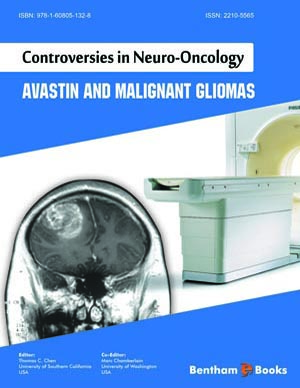Abstract
Angiogenesis, largely driven by vascular endothelial growth factor (VEGF) is essential to the growth of glioblastoma (GBM). Furthermore, a mesenchymal gene signature related to vascular proliferation has been identified in a subset of poor prognosis GBM patients suggesting that a proangiogenic phenotype negatively influences survival. Therefore, disruption of the angiogenic cascade is a logical therapeutic target. Recently, antiangiogenic therapy using bevacizumab, a VEGF targeting antibody, has shown promise against recurrent GBMs. A Phase III double blind placebo-controlled trial, RTOG 0825 was recently launched to compare conventional concurrent chemoradiation and adjuvant temozolomide plus bevacizumab versus treatment without bevacizumab in patients with newly diagnosed glioblastoma. MGMT methylation status and molecular profile are incorporated into the stratification design. This will not only balance the two treatment arms for these prognostic factors, but also may lead to prospective determination of optimal, individualized therapy based on tumor specific molecular profiles.






















